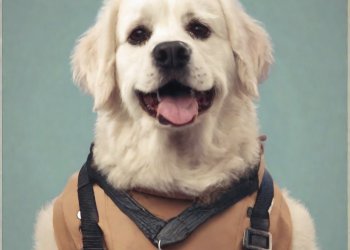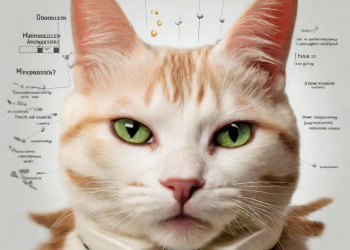Colitis in dogs: a common condition in canines
Researching colitis in dogs, I discovered that it is an inflammation of the colon that can cause discomfort and digestive problems in our furry friends. In this article, I will provide you with information about the causes, symptoms, diagnosis, treatment and prevention of colitis in dogs, as well as useful tips and real cases of dogs that have overcome this condition. Read on to learn more about how to care for your dog with colitis!
What is colitis in dogs?
Colitis in dogs is an inflammatory disease of the colon that can cause diarrhea, abdominal pain, and other uncomfortable symptoms in dogs. It is important to know the symptoms, causes and treatments of this disease in order to help your dog feel better and improve his quality of life.
If you have a dog and want to ensure that it is healthy and happy, it is crucial that you know about colitis and how it affects your pet. Additionally, by reading this article, you can learn how to prevent and treat colitis in dogs, which can save you time, money, and worry in the future. Read on to find out everything you need to know about colitis in dogs!
Diagnosis of colitis in dogs
Once colitis is suspected in a dog, it is important to take him to the veterinarian for a proper diagnosis. The diagnosis of colitis in dogs is usually made through a process of eliminating other possible causes of the symptoms. Some of the tests and procedures that can be used to diagnose colitis in dogs are:
Physical exam
The veterinarian will perform a complete physical examination of the dog, including palpation of the abdomen to detect any abnormalities or tenderness. They may also review the dog’s medical history and ask questions about the dog’s diet and lifestyle.
Blood and stool tests
Blood and stool tests can be performed to look for any signs of infection, inflammation, or imbalances in the dog’s body. The results of these tests can help determine the underlying cause of colitis.
Imaging tests
In some cases, imaging tests such as x-rays or ultrasound may be performed to detect any abnormalities in the dog’s internal organs. These tests may be helpful in ruling out other diseases that may cause symptoms similar to colitis.
Treatment of colitis in dogs
Once the diagnosis of colitis has been confirmed in a dog, the veterinarian will recommend an appropriate treatment plan. Treatment of colitis in dogs may include:
Diet changes
One of the most effective ways to treat colitis in dogs is through dietary changes. Some natural foods that can help relieve colitis symptoms in dogs include:
- Integral rice
- Pumpkin puree
- boiled chicken
- plain yogurt
On the other hand, it is important to avoid certain foods that can worsen the symptoms of colitis in dogs, such as fatty, spicy or high-fiber foods.
Medicines
In some cases, your veterinarian may prescribe medications to treat colitis in dogs. Some of the commonly used medications include:
- Antibiotics to treat bacterial infections
- Anti-inflammatories to reduce inflammation in the digestive tract
- Probiotics to restore healthy intestinal flora
fluid therapy
In more severe cases of colitis in dogs, fluid therapy may need to be administered to prevent dehydration and restore the electrolyte balance in the dog’s body.
Surgery
In extremely severe cases of colitis in dogs, surgery may be necessary to remove any blockages or abnormalities in the digestive tract.
Prevention of colitis in dogs
While it is not always possible to prevent colitis in dogs, there are some steps that can be taken to reduce a dog’s risk of developing it. Some ways to prevent colitis in dogs include:
- Feed the dog an adequate and balanced diet
- Avoid sudden changes in diet
- Keep the dog free of parasites
- Provide regular and sufficient exercise
Colitis in puppies and older dogs
Colitis in dogs can affect dogs of all ages, but there are some differences in causes and treatment in puppies and older dogs.
Colitis in puppies
Puppies may be more prone to developing colitis due to their still developing immune system and their tendency to chew foreign objects. Some of the common causes of colitis in puppies include:
- Bacterial or viral infections
- Intestinal parasites
- Food intolerances
Treatment of colitis in puppies may include dietary changes, medications, and fluid therapy.
Colitis in older dogs
Older dogs may be more likely to develop colitis due to their weakened immune systems and higher risk of chronic diseases. Some of the common causes of colitis in older dogs include:
- Inflammatory bowel diseases
- intestinal tumors
- Endocrine diseases
Treatment of colitis in older dogs may include dietary changes, medications, and fluid therapy, but may also require a more comprehensive approach to treating any underlying disease.
Colitis in dogs and stress
Stress can be a trigger for colitis in dogs, especially those that are prone to digestive problems. Some ways to reduce stress in dogs include:
- Provide a calm and safe environment
- Avoid sudden changes in routine
- Provide enough exercise and mental stimulation
If stress is suspected as a factor in a dog’s colitis, your veterinarian may recommend behavior therapy or medications to help reduce anxiety.
Home remedies for colitis in dogs
In addition to medical treatments, there are also some home remedies that can help relieve the symptoms of colitis in dogs. Some of these include:
- Natural foods such as brown rice, pumpkin puree, and boiled chicken
- Herbs and supplements such as chamomile, turmeric, and fish oil
- Prepare a homemade diet for dogs with colitis
When to go to the vet?
It is important to be aware of the symptoms of colitis in dogs and seek veterinary care if this disease is suspected. Some situations in which you should go to the vet immediately include:
- Persistent vomiting
- bloody diarrhea
- Extreme weakness or lethargy
In other cases, you can wait and see if symptoms are mild, but it is important to seek veterinary care if symptoms do not improve within a few days or if they worsen.
Real cases of colitis in dogs
To help better understand colitis in dogs, it is helpful to read real case stories of dogs who have suffered from this disease. Some of these stories can provide valuable information about how the problem was resolved and what tips may be helpful to other owners of dogs with colitis.
Frequently asked questions about colitis in dogs
To clarify any doubts or concerns about colitis in dogs, it is important to review some frequently asked questions about this disease. Some of these questions may include:
- Can I give human medications to my dog with colitis?
- Is colitis in dogs contagious?
- Can dogs with colitis continue to exercise?
- Is colitis in dogs a chronic disease?
References
It is important to use reliable sources when looking for information about colitis in dogs. Some of the sources used in this article include:
- Articles and studies related to colitis in dogs
- Veterinary and animal health organizations
- Experience and advice from dog owners with experience in colitis
III. Treatment of colitis in dogs
Colitis in dogs is a condition that can be treated effectively with dietary changes, medications, and fluid therapies. It is important to follow the veterinarian’s recommendations and be patient, as recovery may take time.
A. Changes in diet
One of the most natural ways to treat colitis in dogs is through dietary changes. Some foods can help reduce inflammation and improve your pet’s intestinal health, while others can worsen symptoms.
- Recommended foods:
- Fiber-rich foods, such as pumpkin, brown rice, and carrots.
- Lean proteins, such as chicken or turkey.
- Foods rich in omega-3 fatty acids, such as salmon.
- Foods to avoid:
- Greasy or spicy foods.
- Foods high in insoluble fiber, such as corn or wheat.
- Foods high in lactose, such as milk.
B. Medications
In more severe cases of colitis in dogs, the veterinarian may prescribe medications to help control the symptoms and treat the underlying cause of the disease. Some of the commonly used medications are:
- Antibiotics: to treat bacterial infections that may be causing colitis.
- Anti-inflammatories: to reduce inflammation in the intestinal tract.
- Probiotics: to restore healthy intestinal flora.
C. Fluid therapy
Fluid therapy may be necessary in cases of severe colitis, especially if the dog is dehydrated due to diarrhea. This can help replenish lost fluids and electrolytes and keep the dog hydrated during treatment.
D. Surgery (in severe cases)
In extremely severe cases of colitis in dogs, surgery may be necessary to remove a blockage or damaged part of the intestine. However, this is a last resort and is only recommended in extreme cases.
Always remember to follow your veterinarian’s recommendations and not give human medications to your dog without his or her approval. With proper treatment and a proper diet, colitis in dogs can be treated effectively and your pet can regain its intestinal health naturally.
IV. Prevention of colitis in dogs
Colitis in dogs can be a recurring and annoying disease for our pets, so it is important to take preventive measures to avoid its appearance. Some ways to prevent colitis in dogs naturally are:
A. Adequate nutrition
- A balanced, high-quality diet is essential to maintain the intestinal health of our dogs.
- Avoid processed and high-fat foods, as they can irritate the digestive tract and trigger episodes of colitis.
- Include foods rich in fiber, such as vegetables and fruits, to promote good digestion and intestinal regularity.
- Consider a specific diet for dogs with gastrointestinal problems, such as colitis.
B. Avoid sudden changes in diet
- Dogs are sensitive to changes in their diet, so it is important to introduce new foods gradually to avoid digestive problems.
- If it is necessary to change your dog’s diet, do it progressively and always under the supervision of a veterinarian.
C. Parasite control
- Intestinal parasites can be a common cause of colitis in dogs, so it is important to keep your pet free of them.
- Regularly use antiparasitic medications recommended by your veterinarian.
D. Regular exercise
- Exercise is essential to maintain the general health of our dogs, including their digestive system.
- A sedentary lifestyle can contribute to constipation and other intestinal problems, so it’s important to make sure your dog gets enough exercise.
By following these preventive measures, you can help keep your dog healthy and prevent the onset of colitis. However, if your dog develops symptoms of colitis, it is important to see a veterinarian for a proper diagnosis and appropriate treatment.
V. Colitis in puppies
Colitis in dogs not only affects adult dogs, but also puppies. Next, the causes, symptoms, treatment and prevention of colitis in puppies will be discussed.
A. Common causes
– Sudden changes in diet
– Ingestion of toxic or spoiled foods
– Bacterial or viral infections
– Intestinal parasites
– Stress
– Food allergies
B. Symptoms
– Diarrhea with blood or mucus
– Vomiting
– Loss of appetite
– Abdominal pain– Dehydration
– Lethargy
C. Treatment
Treatment of colitis in puppy dogs is similar to that of adult dogs, but their age and weight should be taken into account when administering medications. Additionally, it is important to consult with a veterinarian before giving any type of treatment.
– Dietary changes: a soft, easy-to-digest diet is recommended, such as rice and boiled chicken. Natural foods such as pumpkin and carrot can also be added to help regulate the intestinal tract.
– Medications: in severe cases, antibiotics or anti-inflammatories may be prescribed to treat infection or inflammation in the intestine .
– Fluid therapy: in cases of dehydration, fluids can be administered intravenously to rehydrate the puppy.
– Parasite prevention: medications can be administered antiparasitics to eliminate any intestinal parasites present.
– Stress reduction: relaxation techniques and games can be implemented to reduce stress in the puppy.
D. Prevention
– Adequate nutrition: it is important to provide a balanced, high-quality diet to prevent digestive problems in puppies.
– Avoid sudden changes in diet: it is recommended to introduce new foods gradually to avoid digestive disorders.
– Parasite control: antiparasitic medications should be administered regularly to prevent intestinal infections.
– Regular exercise: exercise helps maintain a healthy healthy digestive tract in puppies.
Always remember to consult with a veterinarian before giving any type of treatment to your puppy with colitis. Prevention is key to keeping your pup healthy and happy.
SAW. Colitis in older dogs
Colitis in older dogs may be more common due to their weakened immune system and possible underlying health problems. The causes, symptoms, treatment and prevention of colitis in older dogs will be discussed below.
A. Common causes
– Underlying health problems, such as kidney or liver disease
– Diet changes
– Stress
– Medications
– Food allergies
B. Symptoms
– Diarrhea with blood or mucus
– Vomiting
– Loss of appetite
– Weight loss– Dehydration
– Lethargy
C. Treatment
Treatment for colitis in older dogs can vary depending on the underlying cause and the dog’s overall health. It is important to consult with a veterinarian to determine the best course of action.
– Dietary changes: a soft, easy-to-digest diet is recommended, such as rice and boiled chicken. Natural foods such as pumpkin and carrot can also be added to help regulate the intestinal tract.
– Medications: Antibiotics, anti-inflammatories, or medications may be prescribed to treat the underlying cause of colitis.– Stress reduction: relaxation techniques and games can be implemented to reduce stress in the dog.
– Fluid therapy: in cases of dehydration, fluids can be administered intravenously to rehydrate the dog.
D. Prevention
– Adequate nutrition: it is important to provide a balanced, high-quality diet to prevent digestive problems in older dogs.
– Avoid sudden changes in the diet: it is recommended to introduce new foods gradually to avoid digestive disorders.
– Parasite control: antiparasitic medications should be administered regularly to prevent intestinal infections.
– Regular exercise: exercise helps maintain a Healthy digestive system in older dogs.
Always remember to consult with a veterinarian before giving any type of treatment to your older dog with colitis. Prevention and proper treatment are essential to keeping your dog healthy and comfortable into his golden years.
SAW. Colitis in older dogs
Colitis in older dogs is a common condition that can affect their quality of life. It is important to understand the causes, symptoms, treatment and prevention of colitis in older dogs to help keep your canine companion healthy and happy.
A. Common causes
- Aging: As dogs age, their digestive system may become more sensitive and prone to colitis.
- Improper diet: A low-fiber diet or sudden changes in diet can cause irritation in the digestive tract of older dogs.
- Underlying diseases: Diseases such as inflammatory bowel disease or cancer can cause colitis in older dogs.
B. Symptoms
- Chronic or intermittent diarrhea
- Blood in the stool
- Flatulence
- Abdominal pain
- Loss of appetite
- Weightloss
C. Treatment
Treating colitis in older dogs is similar to that of adult dogs, but may require a gentler approach due to their age. Some treatment options include:
- Diet changes: An easy-to-digest, high-fiber diet can help relieve colitis symptoms in older dogs.
- Medications: Anti-inflammatory medications and probiotics can help reduce inflammation and restore healthy intestinal flora.
- Fluid therapy: In cases of severe dehydration, intravenous fluids may be needed.
- Surgery: In severe cases of colitis, surgery may be necessary to remove a blockage or treat an underlying disease.
D. Prevention
Some preventive measures that can help prevent colitis in older dogs include:
- Proper nutrition: Make sure your dog receives a balanced, high-fiber diet to keep his digestive system healthy.
- Avoid sudden changes in diet: If you need to change your dog’s diet, do so gradually to avoid digestive problems.
- Parasite control: Make sure your dog is up to date on parasite treatments to prevent intestinal infections.
- Regular exercise: Exercise helps keep the digestive system moving and can prevent constipation and diarrhea.
In summary, colitis in older dogs is a common condition that can be treated and prevented with dietary changes, medications, and proper care. If your older dog is showing symptoms of colitis, it is important to see a veterinarian for proper diagnosis and treatment.
VII. Colitis in dogs and stress
Colitis in dogs can be caused by a variety of factors, including stress. It is important to understand the relationship between stress and colitis in dogs in order to properly prevent and treat this condition. Here we will discuss how stress can affect dogs and how we can reduce it to help relieve colitis in dogs naturally.
A. Relationship between stress and colitis
Just like in humans, stress can have a negative impact on dogs’ health. Chronic stress can affect the immune system and cause inflammation in the gastrointestinal tract, which can lead to colitis in dogs. Additionally, stress can cause changes in diet and exercise habits, which can also contribute to colitis.
B. How to reduce stress in dogs
There are several ways to reduce stress in dogs, including:
- Provide a calm and safe environment for the dog
- Establish a consistent daily routine
- Provide enough exercise and mental stimulation
- Avoid stressful situations, such as changes in your home or routine
- Provide toys and activities that help reduce stress, such as chewing and playing
C. Treatment of stress-related colitis
If stress is suspected as the cause of colitis in a dog, it is important to address both the stress and the colitis in treatment. In addition to reducing stress, other natural treatments for colitis in dogs can be followed, such as changes in diet and the use of herbs and supplements. It is also important to work with a veterinarian to determine the best treatment option for the individual dog.
In summary, stress can be a major factor in colitis in dogs and it is important to address it along with other natural treatments to help relieve symptoms and prevent future outbreaks. By providing a calm, safe environment and following a consistent routine, we can help our dogs stay healthy and happy.
VIII. Home remedies for colitis in dogs
Colitis in dogs is a condition that can be treated naturally, without the need for medication. Below are some home remedies that can help relieve colitis symptoms in dogs naturally:
A. Recommended natural foods
- White Rice: White rice is a mild, easy-to-digest food that can help soothe your dog’s digestive tract. You can cook it with chicken broth to give it a more attractive flavor.
- Pumpkin: Pumpkin is rich in fiber and can help regulate your dog’s intestinal transit. You can cook it and mix it with his food or give him a spoonful directly.
- Boiled chicken: Boiled chicken is a source of lean protein that can be easily digested by dogs with colitis. You can mix it with white rice to make a soft and nutritious food for your dog.
B. Herbs and supplements
- Chamomile: Chamomile has anti-inflammatory properties and can help calm your dog’s digestive tract. You can prepare an infusion and mix it with their food or give them a few drops directly in their mouth.
- Probiotics: Probiotics can help restore the balance of beneficial bacteria in your dog’s intestine. You can find dog-specific probiotic supplements at pet stores or online.
- Digestive Enzymes: Digestive enzymes can help improve your dog’s digestion and reduce inflammation in the digestive tract. You can find dog-specific digestive enzyme supplements at pet stores or online.
C. How to prepare home remedies for colitis in dogs
It is important to consult with your veterinarian before giving your dog any home remedies, especially if he is taking medication. Below are some ways to prepare the home remedies mentioned above:
- White rice with chicken broth: Boil one cup of white rice in two cups of chicken broth until smooth. Let cool and mix with your dog’s food.
- Cooked pumpkin: Boil a cup of pumpkin until soft. Let cool and mix with your dog’s food or give him a spoonful directly.
- Boiled chicken with white rice: Boil a chicken breast in water until cooked. Shred the chicken and mix with a cup of cooked white rice.
- Chamomile infusion: prepare a chamomile infusion and let it cool. Mix it with your dog’s food or give it a few drops directly in its mouth.
Always remember to consult with your veterinarian before giving any home remedies to your dog. Additionally, it is important to follow your veterinarian’s recommendations and continue with the appropriate treatment for colitis in dogs.
IX. When is it necessary to go to the veterinarian to treat colitis in dogs?
Colitis in dogs is a condition that can be treated successfully in most cases, especially if it is detected and treated early. However, there are times when it is necessary to seek professional help to ensure the health and well-being of your pet. Below are some situations in which it is important to go to the veterinarian to treat colitis in dogs:
Emergency symptoms
- Blood in the stool
- Persistent vomiting
- Severe and frequent diarrhea
- Loss of appetite and weight
- Lethargy and weakness
If your dog exhibits any of these symptoms, it is important to seek veterinary care immediately. These may be signs of severe colitis or another medical condition that requires urgent treatment.
When to wait and see
- Mild and occasional diarrhea
- Changes in appetite and activity
- Mild stomach upset
If your dog exhibits these symptoms, it may not be necessary to go to the vet right away. However, it is important to watch for any changes or worsening of symptoms. If diarrhea persists for more than 24 hours or if your dog shows signs of discomfort, it is advisable to seek veterinary help.
Importance of a proper diagnosis
It is important to remember that colitis in dogs can be caused by a variety of factors, and each case may require different treatment. Therefore, it is crucial to obtain a proper diagnosis from a veterinarian before beginning any treatment. Some possible causes of colitis in dogs include:
- Food intolerances
- Intestinal parasites
- Bacterial or viral infections
- Stress or anxiety
- Chronic diseases such as inflammatory bowel disease
A veterinarian will be able to perform a physical examination, blood and stool tests, and possibly imaging tests to determine the underlying cause of colitis in your dog. This will help ensure proper and effective treatment for your pet.
In summary, it is important to be aware of the symptoms of colitis in dogs and seek veterinary help when necessary. With proper diagnosis and proper treatment, your dog can make a full recovery and return to a happy, healthy life.
Colitis in Dogs: Causes, Symptoms, Diagnosis and Treatment
Colitis in dogs is an inflammation of the colon that can be caused by various factors, such as changes in diet, infections, parasites and stress. This condition can be very uncomfortable for dogs and affect their quality of life. In this article, we will explore in detail what colitis in dogs is and how it can be treated naturally.
What is colitis in dogs?
Colitis in dogs is an inflammation of the colon, also known as the large intestine. This inflammation can be caused by a variety of factors and can affect dogs of all ages and breeds.
Causes of colitis in dogs
- Changes in diet: improper feeding or sudden changes in diet can cause irritation in the colon of dogs.
- Infections: Bacteria, viruses and parasites can cause infections in the colon of dogs, leading to colitis.
- Parasites: Worms and other intestinal parasites can cause inflammation in the colon of dogs.
- Stress: Stress can affect the digestive system of dogs and cause colitis.
Symptoms of colitis in dogs
- Diarrhea, often with blood or mucus.
- Constipation.
- Abdominal pain.
- Vomiting.
- Loss of appetite.
- Lethargy.
Diagnosis of colitis in dogs
If you suspect your dog may have colitis, it is important to take him to the vet for a proper diagnosis. The veterinarian will perform a physical examination and may recommend additional tests, such as blood and stool tests, and imaging tests such as x-rays or ultrasounds.
Treatment of colitis in dogs
Treatment for colitis in dogs will depend on the underlying cause and severity of the condition. However, there are some general measures that can help relieve symptoms and promote colon healing.
Diet changes
Adequate nutrition is essential for the treatment of colitis in dogs. Some recommended foods for dogs with colitis include:
- Lean proteins such as chicken, turkey or fish.
- White rice or boiled potatoes.
- Cooked vegetables such as pumpkin or carrots.
- Fiber-rich foods such as canned pumpkin or oat bran.
On the other hand, foods that can irritate the colon should be avoided, such as fatty foods, dairy products, and foods high in fiber.
Medicines
In more severe cases, your veterinarian may prescribe medications to treat colitis in dogs. These may include:
- Antibiotics to treat bacterial infections.
- Anti-inflammatories to reduce inflammation in the colon.
- Probiotics to restore healthy intestinal flora.
fluid therapy
In cases of severe diarrhea, intravenous fluids may be needed to prevent dehydration.
Surgery
In extremely severe cases, surgery may be necessary to treat colitis in dogs. However, this is rare and is only recommended in critical situations.
Prevention of colitis in dogs
Some preventive measures can help prevent colitis in dogs, including:
- Proper nutrition and avoid sudden changes in diet.
- Parasite control through the use of preventive medications.
- Regular exercise to maintain a healthy digestive system.
Colitis in puppies and older dogs
Colitis can affect dogs of all ages, but is most common in puppies and older dogs. Some specific considerations for these life stages include:
Colitis in puppies
Puppies are more prone to colitis due to their immature digestive system and tendency to chew foreign objects. Some preventive measures include keeping an eye on them while they play and providing an age-appropriate diet.
Colitis in older dogs
Older dogs can develop colitis due to underlying health problems, such as kidney or liver disease. It is important to take your older dog to the vet regularly to detect any health problems and treat them early.
Colitis in dogs and stress
Stress can affect the digestive system of dogs and trigger colitis. Some ways to reduce stress in dogs include:
- Maintain a consistent daily routine.
- Provide a calm and safe environment.
- Provide enough exercise and mental stimulation.
If your dog suffers from stress-related colitis, it is important to address the underlying cause and treat it appropriately.
Home remedies for colitis in dogs
In addition to medical treatment, there are also some home remedies that can help relieve the symptoms of colitis in dogs. Some options include:
- Recommended natural foods such as pumpkin, rice and chicken.
- Herbs and supplements such as chamomile, turmeric, and fish oil.
- Prepare home remedies such as bone broth or chamomile tea.
It is important to consult with your veterinarian before trying any home remedy to make sure it is safe and suitable for your dog.
When to go to the vet?
It is important to be aware of the symptoms of colitis in dogs and take your pet to the veterinarian if you notice any of the following signs:
- Blood in the stool.
- Diarrhea or severe constipation.
- Frequent vomiting.
- Loss of appetite and lethargy.
If your dog has mild symptoms, you can wait and observe for a day or two before taking him to the vet. However, if symptoms persist or worsen, it is important to seek medical attention immediately.
Real cases of colitis in dogs
To help better understand colitis in dogs, included are real case stories of dogs who have suffered from this condition. These stories can provide valuable information and advice from dog owners experienced in managing colitis.
Frequently asked questions about colitis in dogs
To address some common questions about colitis in dogs, a frequently asked questions section is included at the end of the article. Some questions that can be answered include:
- Can I give human medications to my dog with colitis?
- Is colitis in dogs contagious?
- Can dogs with colitis continue to exercise?
- Is colitis in dogs a chronic disease?
References
To ensure the accuracy and reliability of the information in this article, a reference section is included at the end. Links to reliable sources used in the research for the article, as well as links to articles and studies related to colitis in dogs, can be found here.










